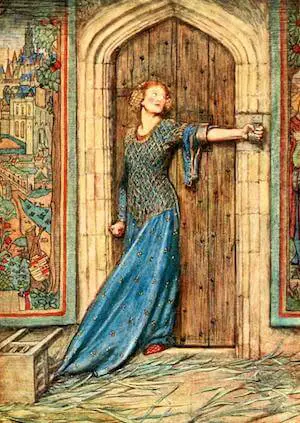The expression ‘Katy, bar the door’ means take precautions; there’s trouble ahead.
The expresssion is also spelled as ‘Katie bar the door’ and the earliest example of the phrase in print spells it that way.
The expression ‘Katy, bar the door’ means take precautions; there’s trouble ahead.
The expresssion is also spelled as ‘Katie bar the door’ and the earliest example of the phrase in print spells it that way.
This phrase ‘Katy bar the door’ is used mostly in southern USA, but it’s not certain that it originated there.
The first known use of Katie bar the door in print that I know of is the US newspaper The Louisiana Democrat, October 1872:
The Custom House Packet, with the Custom House colored band, U.S. Marshal Packard, in command, with the old flag triumphantly kissing the breeze of old Red, the band playing “Katie, Bar The Door,” and with waving rags touched the wharf and proceeded to land her precious cargo.
That snippet doesn’t make the meaning clear. For that we need a slightly later US newspaper entry – The Democrat, October 1879:
To sum it all up, my advice to anyone thinking of going there would be “don’t,” unless they have a pocketfull of the “rhino” which they can afford to lose. I saw it was “Katy bar the door” with me unless I skipped, and I lost no time in skipping.
One suggestion as to the origin of the phrase is that it comes from the traditional Scottish folk-song ‘Get Up and Bar the Door‘. This was published by the Scottish song collector and editor David Herd, in his collection Ancient and Modern Scottish Songs, Heroic Ballads, etc., 1776. The basis of the song is the stubbornness of a husband and wife who disagree about who should lock the door to their house and make a pact that whoever speaks first should do it, thereby allowing ‘two gentlemen’ to enter the house uninvited:
It fell about the Martinmas time,
And a gay time it was then,
When our good wife got puddings to make,
And she’s boild them in the pan.
…
Then up and started our goodwife,
Gied three skips on the floor:
“Goodman, you’ve spoken the foremost word,
Get up and bar the door.”
The points against this being the phrase’s origin are that it doesn’t mention Katie and it isn’t American, although the latter point could be explained by the emigration of many Scots to the USA at the end of the 19th century. It does, however, correspond with the meaning of the phrase, that is, it links the failure to bar the door with impending trouble.
Another suggestion is that the phrase originates with the story of Catherine Douglas and her attempt to save the Scottish King James I.
He was attacked by discontented subjects in Perth in 1437. The room James was in had a door with a missing locking bar.
The story goes that Catherine Douglas tries to save him by barring the door with her arm. Her arm was broken and the mob murdered the King. The ‘lass that barred the door‘ – Catherine Douglas, was henceforth known as Catherine Barlass.
The story, although in it is the full Sir Walter Scott romantic history style, is quite well documented from contemporary records and the descendants of Catherine Douglas still use the Barlass name.
The event was commemorated in Dante Gabriel Rossetti’s poem The King’s Tragedy, 1881. The full poem is 173 stanzas, but this selection shows the possible links with Katy bar the door:
Then the Queen cried, “Catherine, keep the door,
And I to this will suffice!”
At her word I rose all dazed to my feet,
And my heart was fire and ice.
…
Like iron felt my arm, as through
The staple I made it pass:-
Alack! it was flesh and bone – no more! 570
‘Twas Catherine Douglas sprang to the door,
But I fell back Kate Barlass.
Which, if either, of the above explanations is correct is uncertain. The Kate Barlass story appears to have the stronger claim.
Trend of katy bar the door in printed material over time

A B C D E F G H I J K L M N O P Q R S T UV W XYZ
American Animals Australian Bible Body Colour Conflict Death Devil Dogs Emotions Euphemism Family Fashion Food French Horses ‘Jack’ Luck Money Military Music Names Nature Nautical Numbers Politics Religion Shakespeare Stupidity Entertainment Weather Women Work
Have you spotted something that needs updated on this page? We review all feedback we receive to ensure that we provide the most accurate and up to date information on phrases.